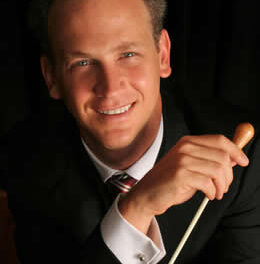The Raleigh Symphony Orchestra played music by Mozart, Schumann, and Samuel Barber in Meredith College’s Jones Auditorium on a gorgeous Sunday afternoon. It was probably too pretty for an indoor concert, but who’d have known that a year ago when the event was planned? Anyway, attendance was down, and that’s a shame, for under the tutelage of music director and conductor Jim Waddelow, the technical and artistic prowess of this outstanding community orchestra have continued to improve. Folks who missed this program had many other choices on this lovely day, ranging from Rachmaninoff over at Broughton High School to chamber music in Durham to plays here and there. The RSO merits the public’s attention and patronage along with all these other presenters and the big heavies in the arts business hereabouts, too.
The program was titled “The Master and Heir Apparent.” I am not sure I got the meaning. Robert Schumann has never struck me as a direct musical descendant of Mozart, although all composers are indebted to him in various ways; nor has Barber – of Adagio for Strings fame – ever reminded this listener of Schumann. That said, there was a very smooth transition, musically, from the opening work, the Overture to Mozart’s Die Entführung aus dem Serail, to Schumann’s “Rhenish” Symphony – and I can think of few more vibrant and buoyant pieces for such a radiant day. The overture is not often heard so it was particularly welcome as things continue to slip and slide in the Middle East. The opera (well, Singspiel, to be precise) deals with a Turkish pasha (with a harem), and the music is rich in Eastern influences as filtered through that aforementioned master – cymbals and drums and reeds and such, being “ingredients” in what the Viennese sometimes called Janissary music, which they craved madly. (Kinda like those Russians, eh: they were our friends and then our enemies and then our friends again and now? Who knows?) The RSO played it in Humperdinck’s performing edition, which incorporates some of the opening music of the score in the grand finale – after already including more music from the opera than many overtures do, making this one a classic study in how to do it the right way. The orchestra sounded great.
And the sound was great, too, in the great “Rhenish” Symphony, Schumann’s most cheerful and engaging work. One could quibble about the little pauses between the movements, and there were some little messy passages here and there (most particularly in the second movement), but the strings were exemplary throughout and the winds and brass often glistened. Balance among the sections was fine, the “presence” of the orchestra was altogether admirable in the hall, and the performance, overall, gave great satisfaction.
After the intermission, during which patrons had an opportunity to visit the lobby tables of concert sponsors Habitat for Humanity, the Lucy Daniels Center, and the Special Olympics, the orchestra took its place for Barber’s substantial “dramatic song,” Knoxville: Summer of 1915. The soloist was soprano Jennifer Paschal, whose diction, superior vocalism, and stage presence made this music glow. The song (or cantata, or whatever you wish to call it) is sentimental, with a somewhat dark undercurrent, that being (as program annotator Mary Greiner reminded us) war, although it does not manifest itself overtly. The point of view is that of a young person, surrounded by family. The words, penned in 1935 by James Agee, were not provided; here’s a link to them, for those who may wish to savor the text without the music. Eleanor Steber sang the premiere and then recorded the work. Her voice is more dramatic than Paschal’s, but the young coloratura made the music her own. And the orchestra was with her at every crucial juncture, providing, together, a stirring cap for a fine season. This orchestra’s worth hearing, worth supporting, worth keeping around. Here’s hoping that it and the other small non-profit performing and presenting organizations in our midst will begin to enjoy some of the tangible benefits of the burgeoning economic recovery before too much longer.
A single chamber program remains for the RSO in this 2013-4 season. Click here for details.











